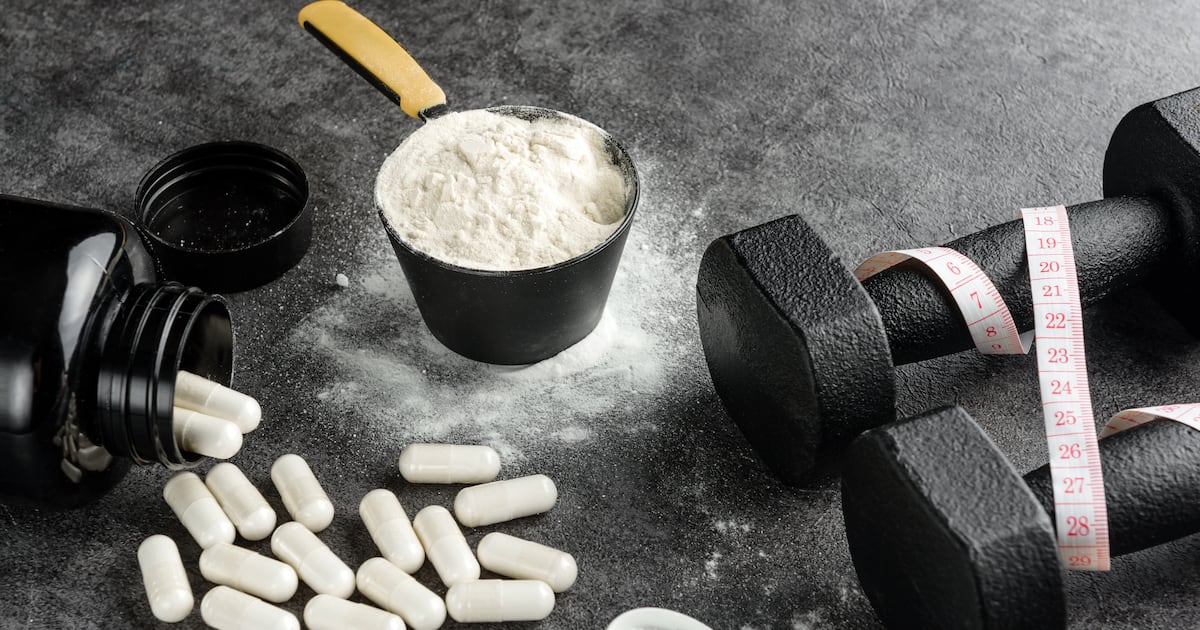Should You Take Creatine? A Guide To Benefits And Risks

Table of Contents
The Science-Backed Benefits of Creatine Supplementation
Creatine monohydrate, the most researched form of creatine, has demonstrated significant benefits for various populations. Its effects stem from its ability to increase phosphocreatine stores in muscles, a crucial energy source for high-intensity activities.
Increased Muscle Strength and Power
Creatine supplementation leads to enhanced ATP (adenosine triphosphate) production. ATP is the primary energy currency of cells, and increased ATP availability directly translates to improved performance during short bursts of intense activity. Numerous studies have shown significant improvements in strength and power across various groups.
- Improved 1RM (one-repetition maximum): Studies consistently report increases in 1RM strength, indicating a boost in maximal strength capabilities.
- Increased explosive power output: Creatine enhances performance in activities requiring explosive power, such as sprinting, jumping, and weightlifting.
- Faster recovery times: By replenishing ATP stores more quickly, creatine facilitates faster muscle recovery between sets and workouts. This allows for more frequent and intense training sessions. This is particularly useful for athletes engaging in high-intensity interval training (HIIT) and resistance training.
Enhanced Muscle Growth and Hypertrophy
Creatine plays a significant role in muscle growth and hypertrophy (increase in muscle size). It promotes muscle protein synthesis, the process by which your body builds muscle tissue. Additionally, creatine increases cell volumization (water retention within muscle cells), creating a more anabolic environment conducive to growth. This effect is amplified when combined with a consistent resistance training program.
- Increased muscle mass: Studies show that creatine supplementation, coupled with resistance training, results in significant increases in lean muscle mass.
- Improved muscle protein synthesis: Creatine enhances the rate of muscle protein synthesis, accelerating muscle growth and repair.
- Increased water retention in muscle cells: This increased cell volumization contributes to muscle growth and improved muscle fullness. Remember this water retention is temporary and not harmful.
Improved Cognitive Function
While primarily known for its muscle-building properties, emerging research suggests creatine may also offer cognitive benefits. Studies have shown potential improvements in memory, learning capacity, and even in individuals with certain neurological conditions. However, more research is needed to fully understand the extent of these effects.
- Improved memory: Some studies indicate that creatine may enhance memory retention and recall.
- Enhanced learning: There's evidence suggesting creatine may improve learning ability and cognitive performance.
- Potential benefits for neurological conditions: Preliminary research suggests potential benefits for conditions like Alzheimer's disease and other neurological disorders, although more extensive research is needed to confirm these effects. Always consult a medical professional before using creatine to manage a medical condition.
Potential Risks and Side Effects of Creatine
While generally safe, creatine can cause some side effects in certain individuals. Most are mild and temporary.
Water Retention and Weight Gain
Creatine causes water retention, primarily in the muscles. This leads to a temporary increase in body weight, often described as "bloating." This is a normal physiological response and not harmful. Managing hydration by drinking plenty of water can help mitigate bloating.
- Temporary weight gain: This weight gain is primarily due to water retention and is usually reversed upon cessation of creatine supplementation.
- Bloating: Some individuals experience bloating, particularly during the loading phase.
- Increased water retention: This increased water retention is a normal physiological response and is generally not cause for concern.
Gastrointestinal Issues
Some individuals experience mild gastrointestinal side effects, especially when starting with high doses.
- Nausea: Nausea is a relatively uncommon side effect but can occur, particularly at the start of supplementation.
- Diarrhea: Diarrhea is another possible side effect, usually resolving as the body adapts.
- Stomach cramps: Abdominal discomfort or cramping can also occur in some users. Starting with a lower dose can help minimize this.
Kidney Function and Creatine Safety
Concerns exist about creatine's impact on kidney function. However, numerous studies involving healthy individuals have found no significant adverse effects on kidney function with proper creatine usage. Individuals with pre-existing kidney conditions or other health problems should consult their physician before using creatine.
- No significant negative impact on kidney function in healthy individuals: Extensive research supports the safety of creatine for healthy kidneys.
- Consult a physician with pre-existing kidney issues: Individuals with kidney problems should discuss creatine use with their doctor before starting supplementation.
How to Use Creatine Effectively and Safely
To maximize benefits and minimize risks, follow these guidelines:
Choosing the Right Creatine Monohydrate
Creatine monohydrate is the most extensively researched and effective form. While other forms exist (e.g., creatine HCL, creatine ethyl ester), there's limited robust evidence to support their superior efficacy compared to creatine monohydrate.
Dosage and Cycling
A common approach involves a loading phase (20 grams daily for 5-7 days) followed by a maintenance phase (3-5 grams daily). However, starting with a lower dose (e.g., 3-5 grams daily) is recommended to assess individual tolerance and gradually increase if needed.
Combining Creatine with Other Supplements and Training
Creatine's effects are synergistically enhanced when combined with resistance training and a balanced diet. Combining it with protein supplements can further support muscle growth and recovery.
Making the Right Choice for You: Should You Take Creatine?
Creatine supplementation offers significant benefits for muscle strength, power, growth, and potentially cognitive function. While some mild side effects are possible, creatine is generally safe for healthy individuals when used appropriately. However, always weigh the benefits and risks of creatine, considering your individual health status and goals. Consult a healthcare professional, especially if you have pre-existing health conditions or are taking other medications. Decide if creatine is right for you based on this information, and learn more about creatine supplementation to make an informed decision.

Featured Posts
-
 Berlin U Bahn Stations Could Techno Djs Take Over
May 16, 2025
Berlin U Bahn Stations Could Techno Djs Take Over
May 16, 2025 -
 The Importance Of Middle Managers Benefits For Businesses And Staff
May 16, 2025
The Importance Of Middle Managers Benefits For Businesses And Staff
May 16, 2025 -
 Microplastiche Nell Acqua Dove Si Concentrano Di Piu
May 16, 2025
Microplastiche Nell Acqua Dove Si Concentrano Di Piu
May 16, 2025 -
 Boston Celtics Historic Game 1 Loss To New York Knicks
May 16, 2025
Boston Celtics Historic Game 1 Loss To New York Knicks
May 16, 2025 -
 Padres 10th Win Clinch First Place Beat Athletics
May 16, 2025
Padres 10th Win Clinch First Place Beat Athletics
May 16, 2025
